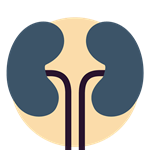
Living with cystinosis
What should you expect when living with cystinosis?
Cystinosis can affect many organs throughout the body; therefore, patients, parents or carers may need support for their emotional and physical well-being.1,2
Throughout the patient’s life, different teams of specialists are involved.1–3 This typically includes kidney specialists (nephrologists), hormone specialists (endocrinologists), brain specialists (neurologists), eye specialists (ophthalmologists), gut specialists (gastroenterologists), dietitians, and physical and behavioural therapists.1-4
The healthcare professionals who treat cystinosis change as patients get older.3-5

Patient5

Paediatrician/ internist2
Provides general medical care

Paediatric nephrologist2,4
Often makes the initial diagnosis and usually coordinates medical care through adolescence

Human geneticist2,5
Confirms a cystinosis diagnosis through genetic tests and conducts genetic consultation and prenatal diagnostic tests

Gastroenterologist2
Manages gastrointestinal issues

Endocrinologist5
Evaluates the need for growth hormone therapy, treats hypothyroidism and diabetes mellitus

Ophthalmologist2,5
Monitors vision and eye health and treats ophthalmic complications

Adult nephrologist4,5
May assume the primary role in coordinating care at the appropriate time for the patient’s transition from paediatric to adult care

Neurologist5
Addresses neuromuscular problems, including swallowing difficulties due to myopathy, which generally appear in late adolescence

Pulmonologist4
Monitors change in pulmonary function

Cardiologist4
Evaluates cardiovascular risk and treats heart

Transplant surgeon2,4,5
Provides medical care before and after a transplantation. He/she also performs the kidney transplantation

Other specialists2,5
Provide additional services that many patients with cystinosis may require such as nutrition counselling, occupational therapy, speech therapy, behavioural nursing care, and medication management and instruction

Therapies to support the kidneys1,5,6
Fluid and salt replacement.
Treatment which reduces inflammation to lower kidney filtration and reduce the amount of urine produced.
Treatment to reduce the amount of protein in the urine.

Diet and nutrition1,5
Free access to fluids is crucial and children should be allowed to eat what they want. If children don't eat enough or have difficulties eating, a G-tube may help.

Growth hormones1,5
Hormones may be offered for patients of short stature. Thyroid hormone or testosterone replacement may be needed.

Cystine depletion1,7
Treatments that reduce the levels of cystine in the body have been shown to delay damage to the kidneys, improve growth of the body, and delay late complications of the condition. However, cystine-depleting therapy alone cannot fully treat the symptoms of cystinosis, particularly for adult patients.
Managing complications of nephropathic cystinosis requires a wide range of treatments.
Cystine-depletion therapy is given both orally and topically (as eyedrops). Kidney transplantation may also be required, which needs to be followed by treatment which dampens the immune system. Other treatments may include insulin to treat diabetes and thyroxine to replace missing thyroid hormones.1,5
At present, there is no cure for the condition, and to date, management of cystinosis has largely focused on treatment of the various symptoms that can be present. Currently the only target-specific treatment for nephropathic cystinosis is cystine-depleting therapy, which is given orally and has been shown to reduce cystine levels in cells throughout the body. Topical cystine-depleting therapy (eyedrops) can be used to dissolve cystine crystals in the eyes.1 Treatment for cystinosis should be started as early in life as possible and will need to continue throughout life, even after a kidney transplant.3
The goal of treatment with cystine-depleting therapy is to delay or prevent damage to cells by keeping cystine levels low at all times. When treatment is inadequate, the amount of cystine in the cells quickly rises to unsafe levels. Because of this, skipping or delaying a dose of cystine-depleting therapy can create the risk of damage to the body and allows cystine levels to rise. That’s why it’s so important to keep cystine levels controlled all the time by taking cystine-depleting therapy exactly as the doctor recommends.1,3,7
This is a serious challenge for adolescents and young adults as they come to adulthood after transition from paediatric to adult care.3
Kidney transplant is an effective treatment for the kidney failure in patients with cystinosis.1,3
People with cystinosis need several examinations to monitor their condition throughout their life. As patients grow from childhood, through adolescence, to adulthood, their healthcare needs will change. Transitioning from paediatric to adult care is particularly challenging and requires a strong supportive network between patients, carers, support specialists and physicians.4
White blood cell cystine test
An important part of monitoring people with cystinosis involves regularly checking the levels of cystine in the white blood cells.3
With treatment, the aim is to keep levels of cystine in the blood low.6
The monitoring for people with cystinosis at different stages of life is summarised below:3,4,8








